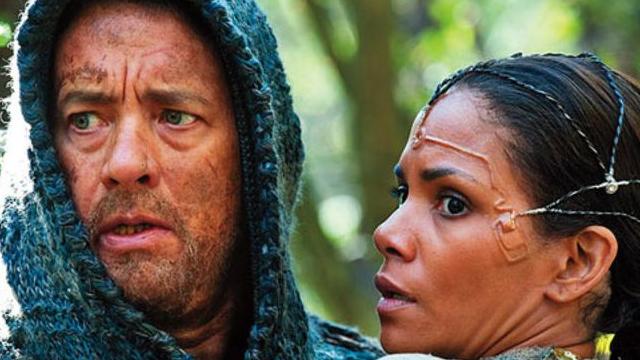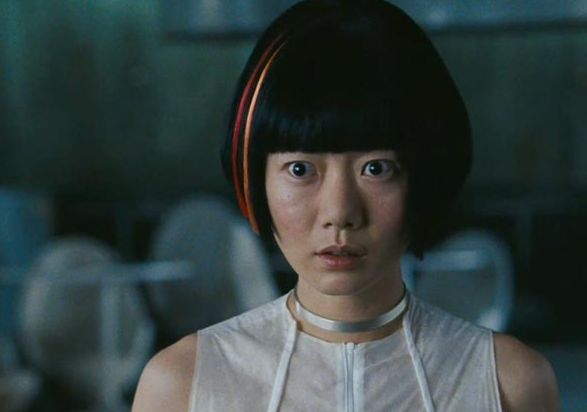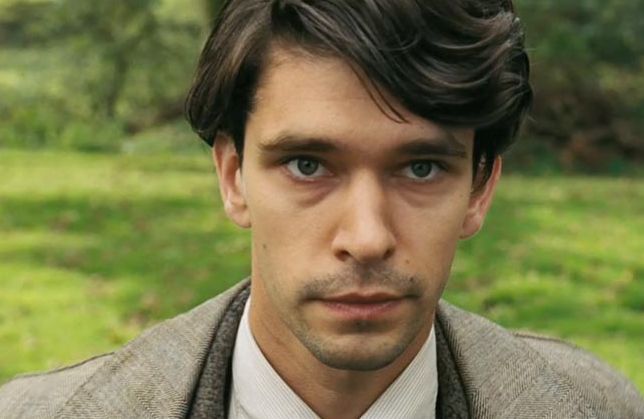Cloud Atlas Review
Donovan's Rating: 8.5/10
Fused Rating: 8.3/10
(2 reviews total)
Tom Tykwer and Andy and Lana Wachowski’s
Cloud Atlas incorporates six different stories into a single film that tells of love, loss, and everything in between – the human experience. This ambitious effort clocks in at almost three hours and deals with often-taboo topics such as gender identity, race, religion, and sexual orientation.
If that weren’t enough, major stars such as Halle Berry and Tom Hanks tackle roles that see them switching up their own ethnicities and genders. For those reasons and more,
Cloud Atlas might be the most ambitious film ever made for mainstream audiences, and such ambition mostly pays off thanks to its stellar cast and incredible craftsmanship.

The film’s earliest thread begins in the 1800s as Adam Ewing (Jim Sturgess) battles sickness on a ship; a composer named Robert Frobisher serves as the primary focus of a 1930s-set thread; Luisa Rey (Halle Berry), a news reporter, sleuths her way through a thread set in the 1970s; publisher Timothy Cavendish (Jim Broadbent) works through a ghastly ordeal involving a nursing home set in the present day; the clone Sonmi-451 (Doona Bae) finds a will of her own against the law of the land in the future; a post-apocalyptic world sees Meryonym (Berry), who hails from a civilized society, visit the community of the primitive Zachry (Hanks).
Cloud Atlas threatens to confuse with its six diverse stories, a large scope and the complex weaving of these narratives — but it just doesn't.
The film works on this complicated level mostly thanks to its ensemble cast. It’s not necessarily how these actors operate in the threads that makes
Cloud Atlas so great. In fact, the film shortchanges much of its cast: Hugh Grant and Susan Sarandon do as well as they can with only stock roles, David Gyasi brings the best out of a small role as a slave, and Berry and Hanks even come across as hammy during the film's post-apocalyptic thread.

Rather, this cast navigates various roles in such a way that exemplifies the universality of the story itself.
Cloud Atlas consciously throws its actors into parts that mirror each other. If you switch Grant and Hanks’ roles in the 1970s-set thread, it hampers the film’s continuity and makes the correlation between roles meaningless. The same applies to Sturgess and Weaving in the Neo-Seoul thread, as well as any other casting decision in the film.
In tandem with the myriad of performances, Alexander Berner’s shrewd editing of the six stories often helps to raise many questions about life and humanity. Tykwer directed some of
Cloud Atlas’ threads, while the Wachowskis tackled the others. For the most part, the trio succeeds in navigating the differing tones and genres to where it all fits together but also exists as its own entity at the same time. Such editing leads to the actors leaving an indelible impact on us.
It was up to Berner to organize these threads in such a way that not only tells the individual stories in a coherent way yet also connects them in a logical way. He gets bonus points for mirroring nearly identical key points in these completely different stories where you might not see a connection otherwise.

There’s admittedly a bit of trouble in
Cloud Atlas’ makeup department, particularly when it comes to James D’Arcy, Jim Sturgess, and Hugo Weaving as characters of Asian descent. It’s also problematic with other actors in the film. Perhaps we’re supposed to notice the makeup as a way to make us think about the issue of race and how Hollywood often presents it. Whether
Cloud Atlas made this decision on purpose, the makeup proves to be jarring.
Cloud Atlas conveys the message that everything is connected, and with its cast, original score, and editing of storylines, the film also makes that theme relevant without having to throw it in your face. It’s a film that probably requires multiple viewings to fully comprehend and appreciate, and while it might not sweep the Oscars, it will do something more important than that: it will make people think and contemplate.
Cloud Atlas is bound to be the most talked-about film of 2012, and it’s one we’ll be talking about for years.
 Ethan thought:
Ethan thought: "The first impulse when faced with such a huge, far-reaching film is usually to nitpick it to death, and you could certainly do so with
Cloud Atlas. Despite a number of earnest speeches, the film’s message of kharmic consequence doesn’t quite land, for a number of reasons. But as a visceral, in-the-moment experience,
Cloud Atlas is so gripping that it hardly even matters. From a formal perspective, this is virtuoso filmmaking: the editing, cinematography and production design on display are so good at building not one, but six fully realized worlds, that it’s a disappointment when each story draws to a close and it’s finally time to leave the theater. The Wachowskis have been responsible for several lifeless CGI spectacle films of late, but by teaming with Tom Tykwer they’ve recaptured some of the narrative energy that powered the original
Matrix. Each of
Cloud Atlas' intertwined stories has its own unique joys to discover (from gender-bending performances to flamboyant action set-pieces), but they are consistent in their entertainment value."
Rating: 8/10
 The film’s earliest thread begins in the 1800s as Adam Ewing (Jim Sturgess) battles sickness on a ship; a composer named Robert Frobisher serves as the primary focus of a 1930s-set thread; Luisa Rey (Halle Berry), a news reporter, sleuths her way through a thread set in the 1970s; publisher Timothy Cavendish (Jim Broadbent) works through a ghastly ordeal involving a nursing home set in the present day; the clone Sonmi-451 (Doona Bae) finds a will of her own against the law of the land in the future; a post-apocalyptic world sees Meryonym (Berry), who hails from a civilized society, visit the community of the primitive Zachry (Hanks). Cloud Atlas threatens to confuse with its six diverse stories, a large scope and the complex weaving of these narratives — but it just doesn't.
The film works on this complicated level mostly thanks to its ensemble cast. It’s not necessarily how these actors operate in the threads that makes Cloud Atlas so great. In fact, the film shortchanges much of its cast: Hugh Grant and Susan Sarandon do as well as they can with only stock roles, David Gyasi brings the best out of a small role as a slave, and Berry and Hanks even come across as hammy during the film's post-apocalyptic thread.
The film’s earliest thread begins in the 1800s as Adam Ewing (Jim Sturgess) battles sickness on a ship; a composer named Robert Frobisher serves as the primary focus of a 1930s-set thread; Luisa Rey (Halle Berry), a news reporter, sleuths her way through a thread set in the 1970s; publisher Timothy Cavendish (Jim Broadbent) works through a ghastly ordeal involving a nursing home set in the present day; the clone Sonmi-451 (Doona Bae) finds a will of her own against the law of the land in the future; a post-apocalyptic world sees Meryonym (Berry), who hails from a civilized society, visit the community of the primitive Zachry (Hanks). Cloud Atlas threatens to confuse with its six diverse stories, a large scope and the complex weaving of these narratives — but it just doesn't.
The film works on this complicated level mostly thanks to its ensemble cast. It’s not necessarily how these actors operate in the threads that makes Cloud Atlas so great. In fact, the film shortchanges much of its cast: Hugh Grant and Susan Sarandon do as well as they can with only stock roles, David Gyasi brings the best out of a small role as a slave, and Berry and Hanks even come across as hammy during the film's post-apocalyptic thread.
 Rather, this cast navigates various roles in such a way that exemplifies the universality of the story itself. Cloud Atlas consciously throws its actors into parts that mirror each other. If you switch Grant and Hanks’ roles in the 1970s-set thread, it hampers the film’s continuity and makes the correlation between roles meaningless. The same applies to Sturgess and Weaving in the Neo-Seoul thread, as well as any other casting decision in the film.
In tandem with the myriad of performances, Alexander Berner’s shrewd editing of the six stories often helps to raise many questions about life and humanity. Tykwer directed some of Cloud Atlas’ threads, while the Wachowskis tackled the others. For the most part, the trio succeeds in navigating the differing tones and genres to where it all fits together but also exists as its own entity at the same time. Such editing leads to the actors leaving an indelible impact on us.
It was up to Berner to organize these threads in such a way that not only tells the individual stories in a coherent way yet also connects them in a logical way. He gets bonus points for mirroring nearly identical key points in these completely different stories where you might not see a connection otherwise.
Rather, this cast navigates various roles in such a way that exemplifies the universality of the story itself. Cloud Atlas consciously throws its actors into parts that mirror each other. If you switch Grant and Hanks’ roles in the 1970s-set thread, it hampers the film’s continuity and makes the correlation between roles meaningless. The same applies to Sturgess and Weaving in the Neo-Seoul thread, as well as any other casting decision in the film.
In tandem with the myriad of performances, Alexander Berner’s shrewd editing of the six stories often helps to raise many questions about life and humanity. Tykwer directed some of Cloud Atlas’ threads, while the Wachowskis tackled the others. For the most part, the trio succeeds in navigating the differing tones and genres to where it all fits together but also exists as its own entity at the same time. Such editing leads to the actors leaving an indelible impact on us.
It was up to Berner to organize these threads in such a way that not only tells the individual stories in a coherent way yet also connects them in a logical way. He gets bonus points for mirroring nearly identical key points in these completely different stories where you might not see a connection otherwise.
 There’s admittedly a bit of trouble in Cloud Atlas’ makeup department, particularly when it comes to James D’Arcy, Jim Sturgess, and Hugo Weaving as characters of Asian descent. It’s also problematic with other actors in the film. Perhaps we’re supposed to notice the makeup as a way to make us think about the issue of race and how Hollywood often presents it. Whether Cloud Atlas made this decision on purpose, the makeup proves to be jarring.
Cloud Atlas conveys the message that everything is connected, and with its cast, original score, and editing of storylines, the film also makes that theme relevant without having to throw it in your face. It’s a film that probably requires multiple viewings to fully comprehend and appreciate, and while it might not sweep the Oscars, it will do something more important than that: it will make people think and contemplate. Cloud Atlas is bound to be the most talked-about film of 2012, and it’s one we’ll be talking about for years.
There’s admittedly a bit of trouble in Cloud Atlas’ makeup department, particularly when it comes to James D’Arcy, Jim Sturgess, and Hugo Weaving as characters of Asian descent. It’s also problematic with other actors in the film. Perhaps we’re supposed to notice the makeup as a way to make us think about the issue of race and how Hollywood often presents it. Whether Cloud Atlas made this decision on purpose, the makeup proves to be jarring.
Cloud Atlas conveys the message that everything is connected, and with its cast, original score, and editing of storylines, the film also makes that theme relevant without having to throw it in your face. It’s a film that probably requires multiple viewings to fully comprehend and appreciate, and while it might not sweep the Oscars, it will do something more important than that: it will make people think and contemplate. Cloud Atlas is bound to be the most talked-about film of 2012, and it’s one we’ll be talking about for years.
 Ethan thought: "The first impulse when faced with such a huge, far-reaching film is usually to nitpick it to death, and you could certainly do so with Cloud Atlas. Despite a number of earnest speeches, the film’s message of kharmic consequence doesn’t quite land, for a number of reasons. But as a visceral, in-the-moment experience, Cloud Atlas is so gripping that it hardly even matters. From a formal perspective, this is virtuoso filmmaking: the editing, cinematography and production design on display are so good at building not one, but six fully realized worlds, that it’s a disappointment when each story draws to a close and it’s finally time to leave the theater. The Wachowskis have been responsible for several lifeless CGI spectacle films of late, but by teaming with Tom Tykwer they’ve recaptured some of the narrative energy that powered the original Matrix. Each of Cloud Atlas' intertwined stories has its own unique joys to discover (from gender-bending performances to flamboyant action set-pieces), but they are consistent in their entertainment value." Rating: 8/10
Ethan thought: "The first impulse when faced with such a huge, far-reaching film is usually to nitpick it to death, and you could certainly do so with Cloud Atlas. Despite a number of earnest speeches, the film’s message of kharmic consequence doesn’t quite land, for a number of reasons. But as a visceral, in-the-moment experience, Cloud Atlas is so gripping that it hardly even matters. From a formal perspective, this is virtuoso filmmaking: the editing, cinematography and production design on display are so good at building not one, but six fully realized worlds, that it’s a disappointment when each story draws to a close and it’s finally time to leave the theater. The Wachowskis have been responsible for several lifeless CGI spectacle films of late, but by teaming with Tom Tykwer they’ve recaptured some of the narrative energy that powered the original Matrix. Each of Cloud Atlas' intertwined stories has its own unique joys to discover (from gender-bending performances to flamboyant action set-pieces), but they are consistent in their entertainment value." Rating: 8/10